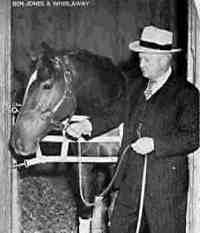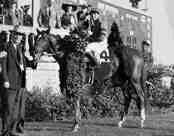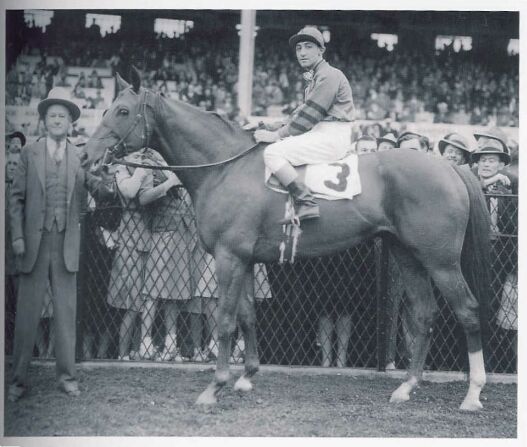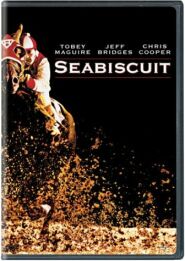

On April 2, 1938, a small chestnut colt later named Whirlaway was foaled at Calumet Farm in Kentucky. During his successful turf career, the chestnut was known to his fans as Mr. Longtail, or The Flying Tail, due to his luxuriously long, thick, and quite unracehorselike posterior ornamentation.
His sire, *Blenheim II, had won the 1930 Epsom Derby for his owner and breeder, the Aga Khan, and had been imported from England in the fall of 1936 by Bull Hancock of Claiborne Farm. His dam, Dustwhirl, was a daughter of the All-American bred Sweep; two-time champion, Belmont Stakes winner, and twice American Leading Sire. Sweep's sire Ben Brush had won the 1896 Kentucky Derby, and his dam was Pink Domino, the most famous daughter of Domino, the great "Black Whirlwind" of the 1890's.
Dustwhirl was out of Ormonda, who as a broodmare produced two Kentucky Derby starters. Osmand had run second by a head in Whiskery's Kentucky Derby1, and Brevity had lost by the same margin to Bold Venture nine years later. Fortunately, the family's luck with the roses was not passed on to Whirlaway.
The son of Dustwhirl was among the Calumet yearlings in the first year that Calumet's horses were trained by the legendary Ben A. Jones and his equally legendary son Jimmy. Also among those youngsters was another chestnut colt by Blenheim II named Easy Blend. Before the horses were put to work, employees were hard pressed to tell them apart. Said Jimmy Jones:
"They were the same size, same color, and had identical markings. What a beautiful driving team they would have made!"
Yet poor Easy Blend "couldn't have outrun the proverbial fat man" as the younger Jones put it, and Whirlaway "gave the impression of being tireless, able to gallop all day if we didn't stop him."
The elder Jones was said to refer to Whirlaway as "The Half Wit" due to his lack of ability to run in a straight line. He had the habit of bearing out, and when he was in the lead he liked to slow down and zig-zag across the track, apparently bored.
The chestnut colt with the flying tail began his racing career on June 3, 1940 with a narrow victory in Chicago under Jack Richard. He was far superior to the rest of the field, as evidenced by the fact that he covered virtually every inch of the track, with special attention given the outside rail, while the rest of the youngsters ran a straight line.
Since Whirlaway was both the most promising and the
most difficult horse in the Calumet lineup in 1940, Ben
and Jimmy Jones  decided that the fairest way to split the
workload was for one of them to concentrate on Whirlaway
while the other trained the rest of the barn. Ben Jones
became Whirlaway's dedicated tutor.
decided that the fairest way to split the
workload was for one of them to concentrate on Whirlaway
while the other trained the rest of the barn. Ben Jones
became Whirlaway's dedicated tutor.
Ben spent hours standing Whirlaway beside the track at Arlington watching other horses work, and found the horse to be extremely loyal to routine. If expected to take an alternate route out to the track for his morning gallop, a tantrum would result.
Johnny Longden failed at the Herculean task of keeping Whirlaway running in a straight line for the Arlington Futurity, and the Calumet horse ended up third behind Swain. When he arrived in New York, he finished second in the United States Hotel Stakes.
In the 1940 Saratoga Special, Whirlaway bore out so badly that he crashed into the outer rail. The fact that he won the race despite the incident didn't keep Ben Jones from calling him a knucklehead, among other things, within the hearing of a reporter.
Whirly may have driven his famous trainer to the edge of insanity, causing Plain Ben to declare him to be the "Dumbest horse I've ever trained," but Jones also knew that Whirlaway was the fastest horse he had yet trained, and continued to spend hours with the colt in an attempt to cure him of his bad habits and fears. Only Plain Ben's love for Whirlaway and his confidence in the horse's talent kept his patience intact.
Whirlaway's devoted exercise rider Pinky Jones, who spent twenty-four hours a day with the horse, shared the trainer's faith, and claimed that his charge could beat anything on four legs. Turf writer Bill Corum also had great confidence in The Flying Tail, predicting that Whirlaway would win the Hopeful and Futurity Stakes in 1940, as well as the next year's Triple Crown. The prediction was a bold one, but by the end of the season Whirlaway had indeed won the Hopeful Stakes, and while Our Boots took the Futurity at Belmont, The Calumet colt did win the Breeders' Futurity at Keeneland. This was most impressive in light of the fact that disaster struck at Saratoga.
In winning the Hopeful, Whirlaway was hit in the eye by flying debris. The speedy chestnut proved he had heart by winning despite the injury, beating Mrs. Parker Corning's Attention, a son of Equipoise who had beaten Whirlaway in the U.S. Hotel Stakes.
Calumet's young star missed two months of racing while veterinarians consulted with human eye specialists on his treatment, finally saving the eye. Whirlaway was healthy and back in winning form in time to win the Breeders' Futurity at Keeneland as well as the Walden Stakes at Pimlico.
He had earned the title of Champion Two Year Old Colt, but was forced to share the honor with Our Boots. Whirlaway was the granted the sole position of high weight on the Experimental Free Handicap, and was the season's top juvenile money winner.
In the spring of 1941, the primary goal of Ben Jones and Calumet Farm was a trip to the winner's circle at Churchill Downs. The favored Nellie Flag had carried the Calumet colors to a fourth place finish behind Omaha in 1935, and Calumet's Bull Lea had been eighth in 1938, the year Ben Jones had trained Lawrin to win.
While wintering in Florida, Whirlaway showed signs he was not in top form. He was kept out of the Flamingo Stakes, while his trainers treated a tiny splint. They later admitted the colt had suffered no such affliction, but simply needed a rest that Warren Wright might not otherwise have understood.
The owner also failed to understand why his horse was entered in a five and a half furlong sprint at Tropical Park a few weeks later. He interrupted a fishing trip to confront Ben Jones about his talented distance runner and Kentucky Derby hopeful being asked to sprint. Fortunately, Whirlaway closed strongly to win, and Wright agreed that he was not a horse trainer, and would refrain from future interference.
In his last two starts before the Derby, the Blue
Grass Stakes and the Derby Trial, Whirlaway ran wide in
the stretch, and it cost him both races. In an attempt to
cure the horse of his apparent fear of the inner rail, Ben
Jones sat on his stable pony while Pinky Brown repeatedly
rode Whirlaway through the gap between the pony and the
rail. This training helped make the difference come
Kentucky Derby day. With the additions of a one-eyed
blinker and the talented jockey Eddie Arcaro, Whirlaway
managed to run in something resembling a straight line,
taking off at the top of the homestretch to romp to an
eight length victory while Our Boots, the horse who had
beaten him in the Blue Grass Stakes, ran eighth. The
victory moved Bill Corum, who had predicted the win almost
year before, to write:
in the Blue Grass Stakes, ran eighth. The
victory moved Bill Corum, who had predicted the win almost
year before, to write:
"Oh Whirlaway, Oh Whirlaway, that you made me feel so good today... One instant they had all been there on the bend together, the next, and only the bright red blouse and the blue cap were where the race was supposed to be going on."
The time of 2:01 2/5 was a new track record, and it stood for more than twenty years. Rumors were spread which suggested that Whirlaway's amazing burst of speed was due not to his own ability, but to drugs instead. A story circulated that the colt had tested positive following a win at Hialeah, but Warren Wright's status prevented the matter from being looked into further. One losing trainer questioned whether or not the Derby winner had been given a saliva test following the race, and a writer claimed that Whirlaway had been given a triple dose of cough medicine prior to the win. Bill Corum responded with:
"No, Dan, it wasn't the cough medicine that carried 'em off; It was the coffin they should have carried the rest of those horses in, When he left 'em for dead at the head of the stretch."
Even the usually calm Ben Jones was angered by the wild accusations, and Churchill Downs officials assured the public that Whirlaway's saliva had tested negative for all drugs following his Kentucky Derby victory.
Whirlaway proved his win in the Derby had been no fluke in the Preakness Stakes. He almost walked out of the starting gate, and when the field passed the stands for the first time, Whirlaway was "so far last that he wasn't bothered by the dust the other horses were raising," as Joe Palmer reported in the following week's Blood-Horse. Eddie Arcaro made his move in the backstretch, and Whirlaway blew by the field in a breathtaking display of speed, winning the Preakness Stakes by five and a half lengths.
On his way to the winner's circle, Eddie Arcaro was jubilant:
"...not even a cyclone could head us off. I don't think I ever passed as many horses in such a hurry. I might as well have been shot from a gun. What a horse! What a horse!"
In summing up his Blood-Horse article, Joe Palmer explained the reason for Whirlaway's victories:
"He carries in his armament the deadliest weapon a thoroughbred can have - an annihilating burst . of speed which he can apparently turn on at any stage of a race."
That annihilating burst of speed scared away most of the competition for the Belmont Stakes, leaving a field of only four horses for the Test of Champions. The other riders tried to throw off Whirlaway's style of running by setting a slow early pace, but Eddie Arcaro anticipated their strategy and The Flying Tail blew by them with impressive ease at the half and kept right on running, becoming Calumet Farm's first of two Triple Crown winners, the other being Citation in 1948. The time of 2:31 for the mile and a half was far from fast, but that wasn't surprising considering the plodding early fractions, or the blistering work the winner had turned in only days before the big race.
Whirlaway beat Market Wise in the Dwyer, won the American Derby in Chicago as well as the Travers Stakes even without the guiding hands of Eddie Arcaro, defeated War Relic in the Saranac Handicap while giving him thirteen pounds, and won the Lawrence Realization at a mile and five eighths.
It was a loss that was deemed to be the finest race of Whirlaway's three-year-old season, however, when he was nosed out by Market Wise in a hard fought Jockey Club Gold Cup. To beat the Triple Crown winner, Market Wise was forced to set a new American record of 3:20 4/5 for the two miles.
As the end of the 1941 season approached, Whirlaway and a string of Calumet Farm horses were shipped to Santa Anita for the upcoming winter races, but the bombing of Pearl Harbor brought an abrupt end to racing on the West Coast. World War II travel restrictions also prevented the horses from being shipped back east, and they were stranded in California until March. Even while marooned, Whirlaway enjoyed some success; the year officially ended and he was named 1941 Horse of the Year and Champion Three Year Old Colt.
As a four-year-old, Whirlaway was a very successful handicap horse, never finishing out of the money. He returned to Churchill Downs to win the Clark Handicap, beat Attention and Mioland in the Dixie Handicap, successfully gave eighteen pounds to runner-up Swing and Sway in the Brooklyn Handicap, won the Garden State Stakes, and won the Narragansett Special under 130 pounds.

In the meantime, a bay colt named Alsab captured the attention of racing fans by winning nine races, including the Preakness Stakes, and earning $234,565 during the season. His accomplishments were particularly impressive to the general public because his owners had acquired him at the Saratoga Yearling Sale for a mere seven hundred dollars.
The two stars met in a match race on September 19 of that year. The contest was a weight for age event, over a distance of a mile and three sixteenths at Narrangansett, and was worth $25,000 to the winner. George Woolf rode Whirlaway in the match, and Carroll Bierman was up on Alsab. The younger horse jumped into the early lead, but Whirlaway was never more than two lengths behind. After stalking Alsab for a mile, Whirly made his move. For the next three sixteenths, the two battled gamely down the stretch, with Whirlaway slowly gaining on his opponent. As the two flew under the wire, it was impossible to say who had won, but the photo finish showed that Alsab had claimed first money by the tip of his right nostril. Mr. Longtail had given away seven pounds to the three-year-old, and had passed him only inches past the wire. The loss was far from a disgrace, but Ben Jones was still more disappointed than he had ever been following a race.
Whirlaway wasted no time avenging the narrow defeat, meeting Alsab in the Jockey Club Gold Cup and winning by three quarters of a length, despite the fact that he once again gave away weight to the younger horse. Also among Whirlaway's successes that season were the Washington Handicap and the Governor Bowie Stakes. Whirlaway took the Pimlico Special in a walkover. No one dared oppose the star.
The Flying Tail finished the season with a victory in the Louisiana Handicap, becoming the first horse to win more than a half million dollars and earning Horse of the Year honors for the second time.
In winning the Louisiana Handicap, Whirlaway bowed a tendon, and although Ben Jones tried to bring his favorite horse back to the winner's circle, he was unsuccessful. On July 5, 1943 Pinky Brown rode Whirlaway in his last public appearance at Washington Park. He then journeyed back to Kentucky, where July 13, the day of his homecoming, was declared "Whirlaway Day" in his honor.
Mr. Longtail stood stud at Claiborne Farm, siring the stakes winners Rock Drill, later the dam of the Champion Three Year Old filly of 1966, Lady Pitt; Scattered, who won the 1948 Coaching Club American Oaks; Going Away, the winner of the 1949 Yankee Handicap; Whirling Fox, Dart By, Duchess Peg, Whirl Flower, and Whirl Some. His daughter Whirling Girl produced a Bull Lea filly named Girlea who in turn produced Lady Golconda, the dam of three time Horse of the Year Forego. Even the foal that resulted from his fertility tests, First Whirl, became a winner.
When the famous French breeder Marcel Boussac saw the champion in 1950, he was immediately taken by the horse. He first convinced Warren Wright to let him lease Whirlaway to stand stud at his Haras Fresvay-le Bufford farm in France, and later, unwilling to part with him, he bought Whirlaway in full. On April 6, 1953, Whirlaway died of a rupture in his nerve tissue, and was buried on Marcel Boussac's farm in France. His body was later returned to Kentucky, and he is now buried at Calumet. Whirlaway became a member of the Hall of Fame in 1959.
| Year | Starts | Wins | Seconds | Thirds | Earnings |
|---|---|---|---|---|---|
| Lifetime | 60 | 32 | 15 | 9 | $561,161 |
| Blenheim II | Blandford | Swynford | John o' Gaunt |
| Canterbury Pilgrim | |||
| Blanche | White Eagle | ||
| Black Cherry | |||
| Malva | Charles O'Malley | Desmond | |
| Goody Two Shoes | |||
| Wild Arum | Robert le Diable | ||
| Marliacea | |||
| Dustwhirl | Sweep | Ben Brush | Bramble |
| Roseville | |||
| Pink Domino | Domino | ||
| Belle Rose | |||
| Ormonda | Superman | Commando | |
| Anomaly | |||
| Princess Ormonda | Ormondale | ||
| Ophirdale |


Video by Carly Kaiser

This text protected by all applicable copyright laws. Do not duplicate or distribute without written permission. © Spiletta42.